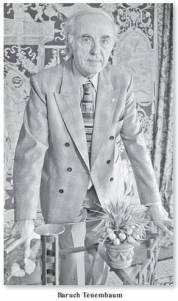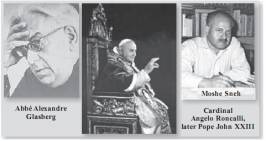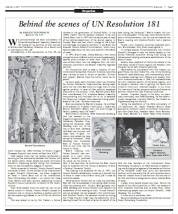We commemorated the 62nd anniversary of United Nations General Assembly Resolution 181 calling for the partition of what was left of British-ruled Mandatory Palestine into a Jewish and an Arab state on Nov. 29.
Coincidentally, a few days earlier, on Nov. 25, the world marked the 128th birthday of Nuncio Angelo Giuseppe Roncalli, later known as Pope John XXIII.
Most people know that his papacy symbolized a warming of the relationship between the Vatican and the Jewish world. Fewer people are aware of Nuncio Roncalli’s life-saving actions during the Holocaust, when he was the apostolic delegate in Istanbul.
While he served in Istanbul, Nuncio Roncalli saved thousands of Jews. As the founder of the International Angelo Roncalli Committee, the Casa Argentina en Israel – Tierra Santa and of the International Raoul Wallenberg Foundation, I am proud that these three NGO’s have been actively researching Nuncio Roncalli’s brave intervention on behalf of the Nazis’ victims.
Even fewer people know that after the war, as apostolic nuncio in France, Nuncio Roncalli played an important role in trying to facilitate a positive vote for the then-upcoming proposal in the UN for the Partition Plan.
This was related to me by Yair Tsaban, a former minister in the government of Yitzhak Rabin. In the 1950s, Tsaban was the personal assistant to the late Moshe Sneh, who in 1947 held the senior post of head of the political department of the Jewish Agency in Europe. Sneh was then also in charge of the aliyah and the illegal immigration portfolio. It was Sneh who revealed Nuncio Roncalli’s involvement, which many believe helped pave the way to the creation of the State of Israel.
In 1947, Sneh’s boss, Moshe Shertok, (who would change his name to Sharet and who would subsequently become prime minister of Israel from 1953 to 1955) was worried about how the delegates from the Latin American countries in the General Assembly regarded partition.
For the partition plan to pass, a majority of two-thirds would be required. The Latin American countries were inclined to vote in favour of partition. Without their support, Shertok knew the motion would be rejected.
He had a great deal of concern about the influence the Vatican wielded on those countries, fearing especially that the Holy See would try to get them to vote against partition, in spite of their publicly expressed intentions to the contrary. Thus, Shertok called Sneh from Lake Success, N.Y., where the General Assembly was convening and instructed him to try to persuade the Vatican not to object to the presumed voting preferences of the Latin American countries.
Sneh was puzzled by Shertok’s request. He confided to his assistant (in Yiddish): ”How could I, Moshe Ben Shimon Klainboim [Sneh], from the small village of Radzin, possibly reach the Pope?”
Sneh turned to his friend, Abbé Alexander Glasberg who had assisted in the llegal immigration efforts to Mandatory Palestine. Even during the Holocaust, Abbé Glasberg went out of his way to save Jews. Glasberg old Sneh that he knew who might help: ”A great humanist who helped the Jews during the Holocaust.” Abbé Glasberg then introduced Sneh to Nuncio Roncalli who at that time was the nuncio in Paris).
Sneh’s meeting with Nuncio Roncalli was conducted in a warm atmosphere. Roncalli promised he would do his utmost to help. A few days later, he confirmed that Sneh would have an audience with the Vatican’s secretary of state – Cardinal Domenico Tardini.
The meeting was scheduled for Oct. 3, 1947, and Nuncio Roncalli deliberately moved up a planned trip to Rome in order to be close at hand, just in case he would be needed.
While Cardinal Tardini did not make any promises, Sneh felt that he succeeded in conveying Israel’s case. After the audience with Tardini, Sneh gathered with Abbé Glasberg and Nuncio Roncalli and reported his impressions of the meeting to them. Nuncio Roncalli was not satisfied. He had expected a firm commitment from Cardinal Tardini. He went even further by hinting that ”Pope Pius XII might lose the opportunity of redeeming himself for his lack of action on behalf of the Jews during the Holocaust.” Sneh’s mission did turn out to be successful. To be sure, other factors contributed to this achievement, too, but one can assume that Sneh’s meeting with Cardinal Tardini had a positive impact.
Twelve Latin American countries supported partition. Six abstained. Only Cuba voted against it. In a single decade, this extraordinary man, Nuncio Roncalli, managed to help the Jewish people at two critical historical junctions: saving lives during the Holocaust and helping achieve the establishment of the State of Israel.
Israelis, Jews, people of all faiths who adhere to the most basic values of human dignity and freedom, owe this great hero a debt of eternal gratitude.
Years before my conversation with Yair Tsaban, my good friend, the late Moshe Tov, one of the founding fathers of Israeli diplomacy, told me extensively about his endless meetings with officials and leaders from Latin American countries. In 1946, Tov had established the Latin American section of the Jewish Agency, and he played a decisive role in gaining the hearts and minds of most Latin American leaders. In my mind, Tov was one of the key players in helping influence the partition votes of the Latin American countries.
Another important player in this story, as previously mentioned, was Abbé Glasberg. He was posthumously recognized in January 2004 by Yad Vashem as Righteous among the Nations.
During the celebration of the 62nd anniversary of UN Resolution 181, Israeli President Shimon Peres received an important visitor to his home: his counterpart from Costa Rica, President Oscar Arias Sanchez. Like Peres, Sanchez is a Nobel Peace Prize laureate.
Both are also members of the International Raoul Wallenberg Foundation, an NGO devoted to researching and divulging the legacies of the rescuers of victims of the Holocaust. Costa Rica has a rich democratic tradition, and it was one of the 12 Latin American countries that voted in favor of the Partition Plan and one of the first countries to recognize the newly created State of Israel.
A great many people played key roles behind the scenes of the vote on partition in 1947: the leaders of Latin American countries such as Costa Rica, noble, well-meaning people such as Nuncio Roncalli, Abbé Glasberg, Tov and Sneh.
It is our duty to remember them.
Baruch Tenembaum is the founder of the International Raoul Wallenberg Foundation.



